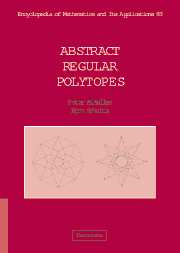Book contents
- Frontmatter
- Contents
- Preface
- 1 Classical Regular Polytopes
- 2 Regular Polytopes
- 3 Coxeter Groups
- 4 Amalgamation
- 5 Realizations
- 6 Regular Polytopes on Space-Forms
- 7 Mixing
- 8 Twisting
- 9 Unitary Groups and Hermitian Forms
- 10 Locally Toroidal 4-Polytopes: I
- 11 Locally Toroidal 4-Polytopes: II
- 12 Higher Toroidal Polytopes
- 13 Regular Polytopes Related to Linear Groups
- 14 Miscellaneous Classes of Regular Polytopes
- Bibliography
- Indices
- List of Symbols
- Author Index
- Subject Index
1 - Classical Regular Polytopes
Published online by Cambridge University Press: 20 August 2009
- Frontmatter
- Contents
- Preface
- 1 Classical Regular Polytopes
- 2 Regular Polytopes
- 3 Coxeter Groups
- 4 Amalgamation
- 5 Realizations
- 6 Regular Polytopes on Space-Forms
- 7 Mixing
- 8 Twisting
- 9 Unitary Groups and Hermitian Forms
- 10 Locally Toroidal 4-Polytopes: I
- 11 Locally Toroidal 4-Polytopes: II
- 12 Higher Toroidal Polytopes
- 13 Regular Polytopes Related to Linear Groups
- 14 Miscellaneous Classes of Regular Polytopes
- Bibliography
- Indices
- List of Symbols
- Author Index
- Subject Index
Summary
Our purpose in this introductory chapter is to set the scene for the rest of the book. We shall do this by briefly tracing the historical development of the subject. There are two main reasons for this. First, we wish to recall the historical traditions which lie behind current research. It is all too easy to lose track of the past, and it is as true in mathematics as in anything else that those who forget history may be compelled to repeat it. But perhaps more important is the need to base what we do firmly in the historical tradition. A tendency in mathematics to greater and greater abstractness should not lead us to abandon our roots. In studying abstract regular polytopes, we shall always bear in mind the geometric origins of the subject. We hope that this introductory survey will help the reader to find a firm basis from which to view the modern subject.
The chapter has four sections. In the first, we provide an historical sketch, leading up to the point at which the formal material of Chapter 2 begins. The second is devoted to an outline of the theory of regular convex polytopes, which provide so much of the motivation for the abstract definitions which we subsequently adopt.
Information
- Type
- Chapter
- Information
- Abstract Regular Polytopes , pp. 1 - 20Publisher: Cambridge University PressPrint publication year: 2002
